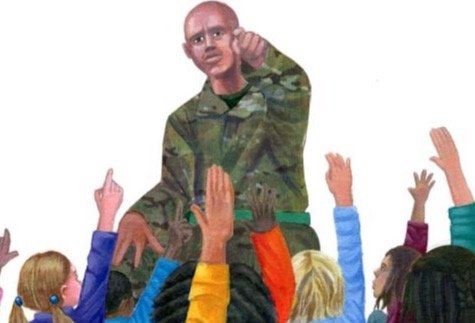‘We take a ten-year span, ’says Colonel David Allfrey, head of army recruitment strategy. ‘It starts with a seven-year-old boy seeing a parachutist at an air show and thinking, ‘That looks great.’ From then on the army is trying to build interest by drip, drip, drip.’
Promoting the Military in Schools – what’s it all about?
Since 2011 during a period of supposed austerity the Government has allocated over £45 million to new educational programmes with ‘a military ethos’. At the same time, the government has slashed Education Maintenance Allowance (EMA), Disabled Students Allowance (DSA) and mental health services for young people.
Former Education Secretary Michael Gove stated “every child in Britain could benefit from a military ethos”, an approach that has been pursued by his successor Nicky Morgan and Edward Timpson, Minister for Children and Families.
Each new ‘military ethos’ programme is presented as in children’s best interests, boosting self-discipline, building character, developing ‘grit’. This strategy has led to military-led activities being integrated into national education policy, plans to spread cadet forces to state schools (550 by 2020); arms companies and the military sponsoring new academies and influencing what they teach; military personnel going into classrooms as speakers, recruiters and teachers, and all of this is taking place with virtually no public debate or wider scrutiny.
You might now be asking the questions what exactly is a military ethos what exactly are military values? Well, answering a Parliamentary question, Mr Laws, Education Minister said: “Military ethos is about improving educational attainment – and those things that support it such as good behaviour and attendance – through instilling positive qualities and values such as confidence, resilience, self-control, loyalty, agency, teamwork and problem solving”. Still unsure, well unfortunately it doesn’t really get any clearer.
The Peace Pledge Union views these developments with concern. No one would doubt that improving educational attainment, the development of self discipline, self-motivation and problem solving alongside team and leadership building are important elements of an education programme. The PPU is, however, opposed to the idea of instilling any ethos or values that are underpinned by notions of unquestioning obedience is acceptable in our state schools’ system or indeed any educational system.
The PPU believes that schools should be properly funded to enable a host of exciting and sometime practical activities to take place. This would include outward bound schemes, youth work activities, vocational tasters and individual and team sporting opportunities. Unfortunately these pursuits are being restricted at the same time more government funding is directed to military related activity.
The MOD has denied that the increased funding for initiatives designed to promote these strangely opaque military values in state schools has anything to do with recruitment to the armed forces. That denial looks rather threadbare when members of the armed forces and ex senior military officers acknowledge how important it is to get into schools as part of an incremental promotion of the armed forces in recruiting young people, many of them just 16 years of age.
However what underpins and characterises all of these initiatives is the promotion of an uncritical acceptance that the armed forces, their interventions across the world, the behaviours and unquestioning discipline implicit within a military ethos are all, per se, good things and that that ethos should be rolled out to young people across the country. ”
The PPU believes that what people need and what young people, in particular, need is more questioning not less. Education should be about developing critical awareness and the challenging of what could be described as people’s “common sense” notions of the world. Pupils should be developing a disdain for considering the use of violence as an acceptable way of resolving differences at any stage be it at local, national or international level. Pupils should be exploring ways of resolving disputes and disagreements in a peaceful fashion; developing methods of conflict resolution should be prioritised. Instilling a military ethos will not enable young people to develop a healthy critical awareness or an understanding of how to peacefully resolve conflicts. A key word is “balance”, pupils should be able to explore alternative perspectives to those that promote unquestioning support to the idea that the wellbeing and security of citizens are always safeguarded by the actions of the military.
Find out about the PPU’s submission to the Commons Education Select Committee inquiry on the Purpose and quality of education in England | here







